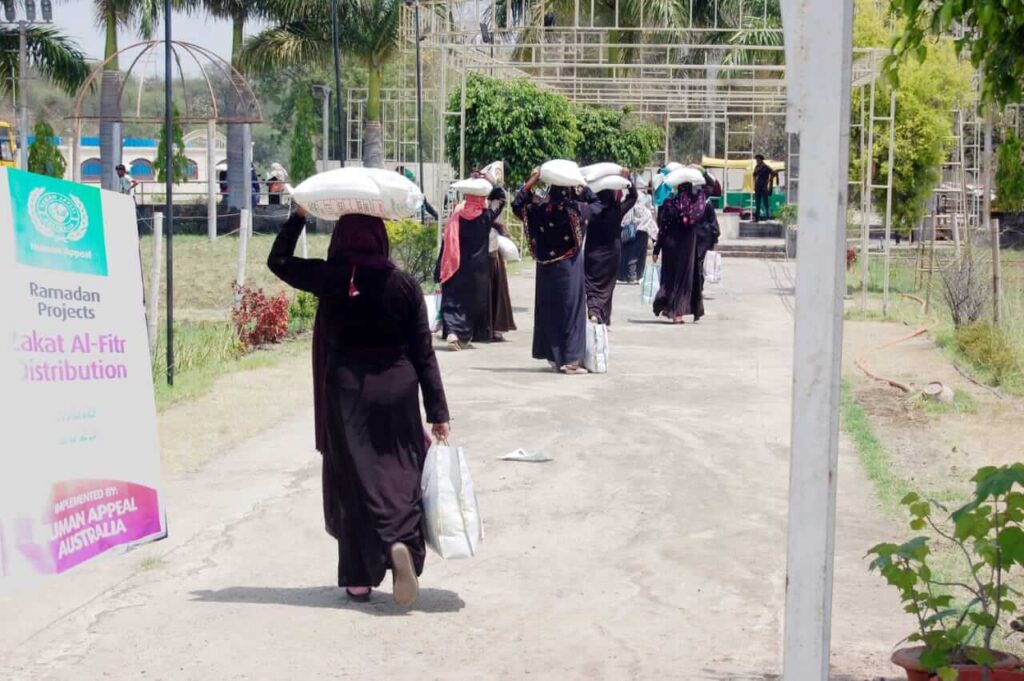What Is It?
Zakat al-Fitr is a duty which is wajib (required) of every Muslim, whether male or female, minor or adult as long as he/she has the means to do so.
According to Islamic tradition (Sunnah), Ibn ‘Umar said that the Prophet Muhammad (saw) made Zakat al-Fitr compulsory on every slave, freeman, male, female, young and old among the Muslims; one Saa of dried dates or one Saa of barley. The saa’, is equivalent to four double handfuls and according to the majority of Sunni scholars, One Saa’ is approximately between 2.6 kg to 3 kg.
The head of the household may pay the required amount for the other members. Abu Sa’eed al-Khudree said:
‘On behalf of our young and old, free men and slaves, we used to take out during Allah’s Messenger’s (pbuh) lifetime one Saa` of grain, cheese or raisins”.’
Why Pay It?
The significant role played by Zakat in the circulation of wealth within the Islamic society is also demonstrated in Zakat al-Fitr. However, the main purpose of Zakat al-Fitr is to provide for the poor so they can celebrate the festival of breaking the fast (`Eid al-Fitr) along with the rest of the Muslims.
Every Muslim is required to pay Zakat al-Fitr at the conclusion of the month of Ramadan as a token of thankfulness to God for having enabled him or her to observe the obligatory fast.
Its purpose is:
-As a levy on the fasting person. This is based on the hadith: The Prophet of Allah (pbuh) said, “The fasting of the month of fasting will be hanging between earth and heavens and it will not be raised up to the Divine Presence without the payment of Zakat al-Fitr.”
-To purify those who fast from any indecent act or speech and to help the poor and needy. The latter view is based upon the hadith from Ibn Abbas who related, “The Prophet of Allah (pbuh) enjoined Zakat al-Fitr on those who fast to shield them from any indecent act or speech, and for the purpose of providing food for the needy. It is accepted as Zakah for the one who pays it before the Eid prayer and it is sadaqah for the one who pays it after the prayer.”
When Should I Pay It?
Zakat al-Fitr is only Wajib for a particular period of time. If one misses his time without a valid reason, he has sinned and can not make it up. This form of charity becomes obligatory from sunset on the last day of fasting and remains obligatory until the beginning of Eid Prayer (i.e. shortly after sunrise on the following day). However, it can be paid prior to the above-mentioned period, as many of the Sahabah (companions of the Prophet) used to pay Zakat al-Fitr a couple days before theEid.
After the spread of Islam, the jurists (fuqaha) permitted its payment from the beginning and middle of Ramadan so as to ensure that the Zakat al-Fitr reached its beneficiaries on or before the day of Eid. It is particularly emphasized that the distribution be before theEid prayers in order that the needy who receive it are able to use the money to provide for their dependents on the day of `Eid.
Nafireported that the Prophet's companion Ibn 'Umar (ra) used to give it to those who would accept it and the people used to give it a day or two before theEid.
Ibn ‘Umar reported that the Prophet (pbuh) ordered that Zakat al-Fitr be given before people go to perform the (`Eid) prayers. One who forgets to pay it on time should do so as soon as possible, even though it will no longer be counted as Zakat al-Fitr.
The amount of Zakat is the same for everyone regardless of their different income brackets. The minimum amount is one saa of food, grain or dried fruit for each member of the family. This calculation is based on Ibn 'Umar's report that the Prophet (pbuh) made Zakat al-Fitr compulsory and payable by a saa of dried dates or a saa` of barley. Cash equivalent may also be given if food collection and distribution is unavailable in that particular country.

